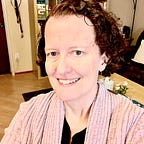Where is God in Times of Despair
A Personal Testimony
2009 was not the best year for me. It began with the cancellation of the winter session at our school and, with it, a class I was looking forward to teaching. That also meant my children would be at home. Three weeks of extra “vacation” that we weren’t expecting that we had to try to fill somehow. Finally, when we returned, we found our beloved little school in financial distress. It would be our last semester. The mood was somber; many people didn’t know where they would go.
Two months later. I remember sitting behind a one-way mirror with a psychologist. We were watching my almost 10-year-old interact with another clinician. He wouldn’t join in the play she initiated but kept doing his own thing. She opened conversation topics, but he ignored them and kept discussing things from his perspective. The psychologist beside me explained this, but I had already noticed it. In the end, he was diagnosed with autism.
Our school closed, and we headed into summer without any idea what to do next. We did meet a family at the park with two autistic children. We tried getting together, but the entire family seemed out of control. Was that what life would be like now? Everything people said to me, including the doctors, was confusing. It was “autism advice,” but it didn’t fit my child’s needs. It didn’t feel like my family. It was like falling into Alice’s looking glass: everyone acted like I was crazy, but I felt like I was the only one who understood my child, and no one would listen.
In the few months since the diagnosis, I had wondered where I would send my kids to school in the fall. Our school had grown from a homeschool center to a small private school, so most people returned to homeschooling. I wanted to do that too, but I would need someone to back me up. My husband wasn’t sure it was the best idea. The doctors said, “OHMYGODNO!!! He needs to socialize!” But the kids (and some of the teachers) had been mean in school. He was punished and not helped. In homeschooling, he made friends, although everything wasn’t perfect. With all the pressure and uncertainty, we put the boys back in public school.
Severe depression gripped me around November, although I remember feeling unwell as far back as summer. On the first day of school, the experience of lining up with my second grader and hearing vulgar, pornographic descriptions of sex coming out of the mouth of the 7-year-old in front of him did not help. Being called into the classroom to be asked how to teach my autistic 10-year-old when I’d only known he was autistic for three months did not inspire confidence. Then, the therapist at the autism clinic asked me how I could not have figured out my son had autism (when their department had failed to diagnose him three years earlier). Yeah, thanks for the “mom guilt.” I don’t know when it was too much, but it all came crashing down at some point.
I couldn’t take it anymore, and I went numb. I felt exhausted and sick. I could barely eat. I dragged myself downstairs every afternoon and tried to help the kids with homework, but I leaned against the wall because I had no energy. It got harder and harder, and I became concerned about them seeing me that way, so I stopped coming down. I cried and felt like a failure over my inability to care for my children. I had been with them since birth, and I felt awful that I was “abandoning” them, even though my husband could work from home and care for them while I was ill.
I was diagnosed with major depression and put on different medications until one helped me a little. Eventually, I was on three. I also prayed, did talk therapy, and did activities in an outpatient program. Most of the people in that program had attempted suicide. A few asked me why I hadn’t. I explained that I was never alone. I went numb and couldn’t feel love, but I knew beyond a shadow of a doubt that God loved me and will always love me.
Sometimes I thought about how nice it would be to fall asleep and never wake up because the constant pain would be gone. But I would immediately say, “NO!” inside my head. I was telling God I didn’t mean that or want that. Again, I knew that people here loved me and needed me. Most importantly, my children. I gave it to God to decide when the depression would be over. Somehow I knew it wouldn’t last forever. So I never thought of ending my life.
So here I am today. It is 14 years later, and I am working with my doctors to eliminate psychiatric medicines. I don’t think I need them anymore, or at least all three that they ultimately put me on.
Both my sons were diagnosed with autism, and I believe I’m autistic as well. Instead of the “big tragedy” that the doctors made it out to be, I now show parents and students how to work with their strengths and use accommodations to help them.
God made something incredible out of a challenging time in my life. The experience strengthened my faith; I know I can cope with anything because God will be with me.
